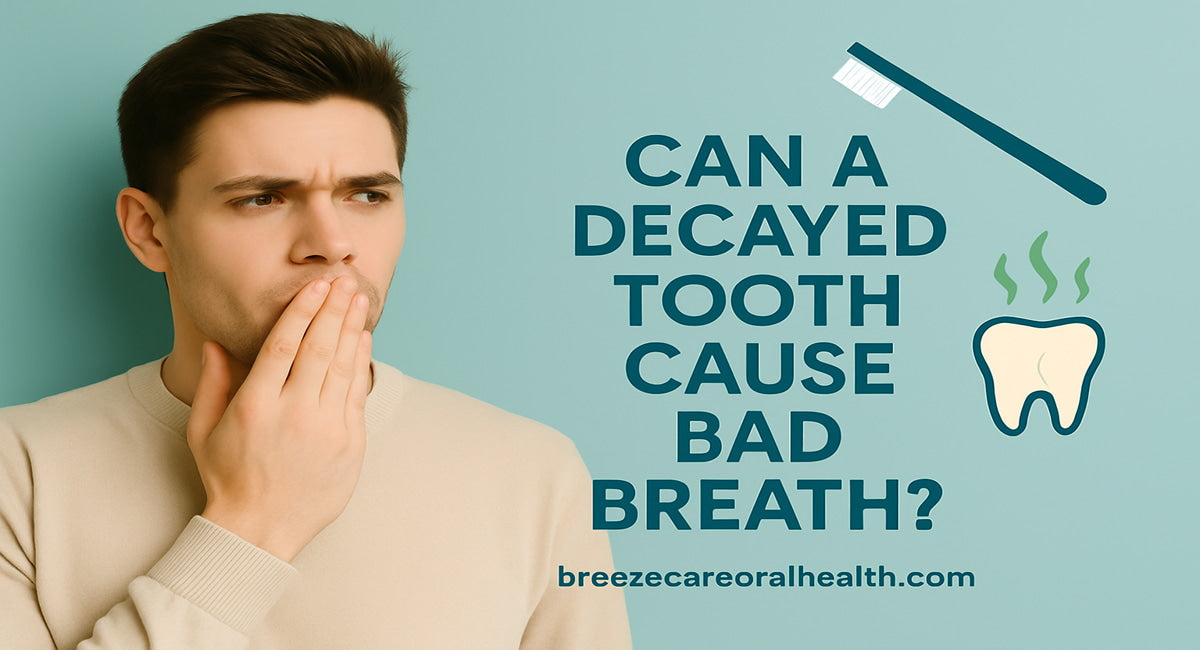Ever brushed your teeth, popped a mint and still found yourself wondering, ‘Why won’t this bad breath go away?’ You’re not alone. Bad breath, officially known as halitosis, affects up to 1 in 4 people globally and can seriously impact confidence, relationships and even job prospects.
While causes like garlic-heavy meals, dry mouth or poor oral hygiene often take the blame, there’s another sneaky culprit that doesn't get enough airtime: tooth decay.
In fact, many people don’t realise a decayed tooth causes bad breath by harbouring bacteria that release foul-smelling sulphur compounds. Put simply, a decayed tooth causing bad breath isn’t just possible; it’s surprisingly common.
In this blog, we’ll break down how a decayed tooth can lead to persistent bad breath, the science behind it and most importantly, what you can do to fix it. Let’s dive in.
What Is a Decayed Tooth?
A decayed tooth is often referred to as a cavity or dental caries. It is the result of a gradual breakdown of your tooth structure.
It starts when plaque, a sticky film of bacteria, accumulates on your teeth and feeds on sugars from food and drink. This produces acids that slowly erode the enamel, your tooth’s hard protective layer.
If left untreated, the decay doesn’t stop there. It can eat its way deeper, reaching the dentin (the softer layer beneath the enamel) and eventually the pulp, where your tooth’s nerves and blood vessels live. That’s when things get painful and smelly.
Besides sensitivity or toothache, a decayed tooth can trap bacteria and release foul-smelling compounds, making it a hidden but powerful contributor to bad breath.
How Does a Decayed Tooth Cause Bad Breath?
When a tooth becomes decayed, it creates the perfect environment for bacteria to thrive. Here’s how it contributes to unpleasant breath:
1. Bacterial Build-up
A decayed tooth often contains a high concentration of bacteria. These bacteria release sulphur compounds and other odorous substances that can make your breath smell foul.
2. Food Trapping
Tooth decay can create holes or pits in the teeth where food particles easily get stuck. If not properly cleaned, these particles rot and emit a strong, unpleasant smell.
3. Infection and Pus
As the decay progresses and reaches the inner layers of the tooth, it may cause an infection or abscess. The presence of pus, combined with the decaying tissues, can significantly worsen breath odour.
Read Also: How to Manage Bad Breath After Tooth Removal
Signs Your Bad Breath May Be Caused by a Decayed Tooth
If you’re wondering whether your bad breath is linked to dental issues, look out for these signs:
-
Persistent foul breath despite brushing and flossing
-
Toothache or sensitivity
-
Visible holes or black spots on your teeth
-
Swelling or pus around the gums
-
A bad taste in your mouth that won’t go away
If you notice any of these symptoms, it’s crucial to see a dentist immediately. A decayed tooth is not just a cosmetic issue. It can lead to more serious oral and systemic health problems.
Treatment Options for a Decayed Tooth
If a decayed tooth causes your bad breath, treating the underlying problem will likely resolve the issue. Depending on the extent of the decay, treatment options include:
-
Dental Fillings: For minor decay
-
Root Canal Treatment: For deeper decay reaching the pulp
-
Tooth Extraction: If the tooth is too severely damaged
-
Antibiotics: In case of infection
Maintaining proper oral hygiene and regular dental visits are crucial for preventing decay and the bad breath it can cause.
Read Also: How to Choose the Best Mouthwash for Bad Breath
Prevention Tips to Avoid Tooth Decay and Bad Breath
Here are some proactive steps to keep your teeth healthy and breath fresh:
-
Brush twice daily with fluoride toothpaste.
-
Floss daily to remove trapped food and plaque.
-
Use an antibacterial mouthwash.
-
Avoid sugary snacks and drinks.
-
Drink plenty of water, especially after meals.
-
Visit your dentist every six months for check-ups and cleans.
Final Thoughts
So, can a decayed tooth cause bad breath? Absolutely. It’s one of the most common yet overlooked causes of persistent halitosis. Addressing tooth decay early not only improves your breath but also protects your overall dental health.
At BreezeCare Oral Health, expert care meets cutting-edge solutions for all your oral health concerns, including stubborn bad breath. If you think a decayed tooth might be the cause, don’t put it off. Book an appointment today and take the first step towards a fresher, healthier smile you can feel confident about.











